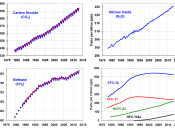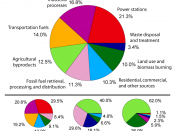The 20th century's 10 warmest years all occurred in the last 15 years of the century. The rising temperatures are expected to raise sea levels, change rainfall, and other climate conditions. Changing the climate could change forests, crops, and water supplies. It might affect our health, or the health of animals including possibly endangering species or making them become extinct. Entire ecosystems could be permanently changed. These could be the effects of global warming.
The National Academy of Sciences says the Earth's surface temperature has risen about 1 degree Farenhight in the last 100 years. However, most of this warming has taken place in the last twenty years. There is also more evidence that most of the warming over the last half-century was caused by humans. Human activities have changed the chemical composition of the atmosphere through the buildup of greenhouse gases. Greenhouse gases are mostly carbon dioxide, methane, and nitrous oxide.
These gases are heat trapping but we don't know exactly how our climate reacts to them. Greenhouse gases trap some of the Earth's out going energy, and thereby keep in heat like the glass of a greenhouse. Scientists believe that burning of fossil fuels and other human activities are biggest reasons carbon dioxide in the atmosphere has increased nearly 30%. Fossil fuels burned to run cars, heat homes, and power factories are responsible for about 98% of the United States carbon dioxide emissions, 24% of the methane emissions, and 18% of the nitrous oxide emission. The United States puts out about 20% of the total global greenhouse gases.
1998 was the warmest year on record. There was less snow in the Northern Hemisphere and less ice floating in the Artic Ocean. The sea level has risen 4-8 inches over the last 100 years. Rainfall over land has increased...


